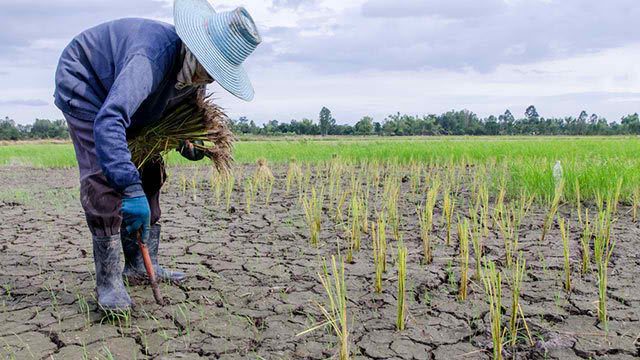SUMMARY
This is AI generated summarization, which may have errors. For context, always refer to the full article.

MANILA, Philippines – Don’t request an additional budget to prepare farmers against El Niño, just re-align unused funds, said Senate president Franklin Drilon to the Department of Agriculture during a September 4 hearing.
This was a response to Agriculture Secretary Proceso Alcala’s request for a P1.9 billion ($43 million) supplementary fund to address the intensified El Niño adversely affecting the agricultural sector.
“You do not need to ask for a supplementary budget because, I can assure you Secretary Alcala, it will not pass in Congress because from what we can see, you have enough funds to respond to this El Niño phenomenon,” said Drilon.
The debate lasted for an hour and a half, stealing the limelight from the scheduled topic of the day, the DA’s 2016 budget.
The DA still has P16.7 billion ($363 million) unused funds in its 2015 budget as of July 31, said Senate Committee on Finance chairperson Loren Legarda.
“Can you not accommodate the P1.9 billion budget in the P16.7 billion?” asked Drilon.
Secretary Alcala clarified that the P16.7 billion balance has already been lined up for other projects for the latter part of the year. In fact, some of it has already been spent.
“It’s not so simple to re-align. We have to meet indicators in the GAA in order to realign, like if the project cannot be implemented because of a natural calamity,” said DA Assistant Secretary for Field Operations Christopher Morales.
Joint resolution offered
But Drilon said, given the DA’s 2015 performance, the agency is able to spend only roughly P3 billion ($65 million) of its funds per month.
With 5 more months to go for 2015, the DA would likely spend only P15 billion, meaning it would have around P1.7 billion in savings. These can then be devoted to the El Niño fund.
“We can have a joint resolution in Congress authorizing the president for you to realign this for the El Niño phenomenon,” offered Drilon.
He added that realignment was the best option for the department given the need to immediately release funds to mitigate El Niño, which is expected to reach its strongest in the next 6 months.
The P1.9 billion El Niño additional funds will go to providing drought-resistant rice seeds for free to farmers, small irrigation facilities, replacement seeds for damaged crops, and cloud-seeding operations, among others.
It is on top of the regular programs of the DA that help improve crop yields, farming efficiency, and farmers’ income.
The breakdown of the P1.9 billion budget presented by the DA is as follows:
| INTERVENTION | BUDGET (PHP) |
| Production Support | 804,107,070 |
| Rice | 308,412,640 |
| Corn | 358,491,400 |
| High-value crops | 90,690,000 |
| Livestock | 46,513,030 |
| Water Management | 989,730,750 |
| Small-scale Irrigation Pumps | 749,730,750 |
| Cloud-seeding Operations | 90,000,000 |
| Alternative Wetting and Drying Promotion | 150,000,000 |
| Information and Education Campaign | 73,000,000 |
| Project Management | 64,933,550 |
| TOTAL: | 1,931,771,370 |
Production support for rice, corn, high-value crops, and livestock means the provision of drought-resilient varieties, replacement seeds and seedlings, and deep wells.
Specifically for high-value crops, production support also includes solar and wind-powered pumps. Such pumps help farmers save on expenses for crude oil used to power ordinary water pumps, said Alcala.
Small-scale irrigation pumps, meanwhile, can be used by farmers to divert water from rivers towards their farmlands.
More funds for rice
But Villar and Drilon did not agree on devoting funds to information and education campaigns saying this could be funded under their regular annual budget.
The senators proposed adding the entire IEC to production support for rice, the crop likely to bear the brunt of drought, being highly water-dependent.
They also recommended transferring the budget for alternate wetting and drying promotion to purchasing more small-scale irrigation pumps.
Villar said alternate wetting and drying promotion was the same as training farmers in efficient farming practices – already a regular program under the DA’s annual budget.
Cloud-seeding operations by the Bureau of Soils and Water Management is supposed to induce rain by spraying iodide salt in clouds.
The DA says it has prepared a strategy for improving resilience of agriculture to El Niño. Alcala said they aim to maximize production in areas not affected by the phenomenon by helping farmers plant high-yielding crop varieties.
They are also encouraging farmers to plant short-gestation crops – crops that can be harvested earlier. This means a shift from palay to crops like corn, sweet potato, and cassava.
Regional agricultural officers are ordered to conduct massive information education campaigns to alert farmers of drought based on projections by the Philippine Atmospheric Geophysical and Astronomical Services Administration (PAGASA).
Alcala said the DA meets regularly with PAGASA in order to monitor El Niño development. He said the agency has already spent P580 million on El Niño mitigation efforts.
The higher temperatures, low rainfall, and drying up of water sources caused by the El Niño has damaged P3.3 billion of crops from February to August 31, according to the DA. Of this, the hardest hit were Regions 2, 10, and 12.
The El Niño is expected to strengthen and last until mid-2016. Sixty-five provinces all over the country are likely to experience drought by February 2016. – Rappler.com
Image of farmer planting in parched land from Shutterstock
Add a comment
How does this make you feel?
There are no comments yet. Add your comment to start the conversation.